Humanizing Patient Care with Smart Healthcare Virtual Assistant
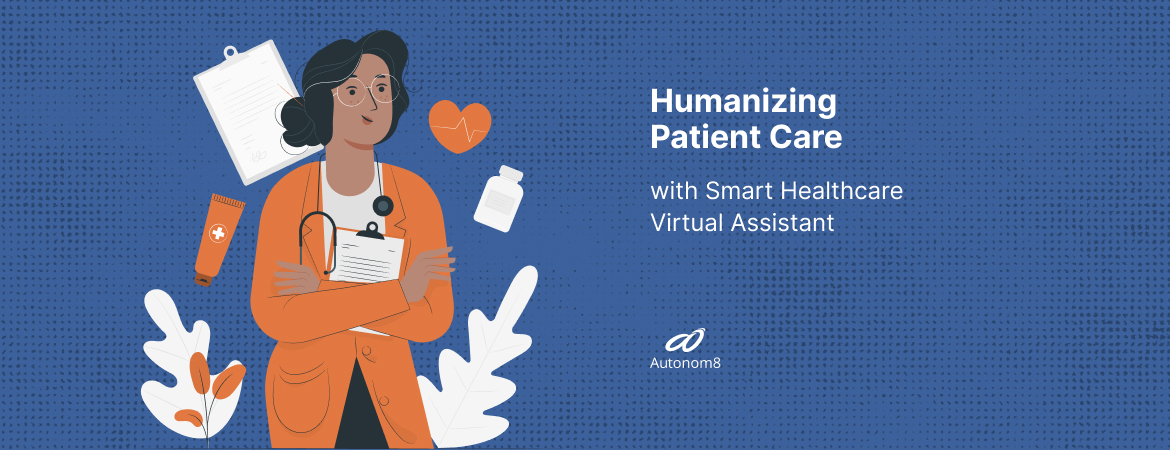

While other industries are adopting modern ways of doing things, healthcare still has a traditional, manual approach to dealing with patients. We can get an online order delivered in a day or a pizza delivered in 30 minutes but a patient still has to wait for weeks to get an appointment with a doctor.
Enter hyperautomation, a transformative technology that combines artificial intelligence, machine learning, and robotic process automation to streamline and automate manual processes. Hyperautomation can play a significant role in humanizing patient care and enhancing the capabilities of healthcare virtual assistants.
Smart Virtual Assistants (aka chatbots) can revolutionize how care providers engage with patients. These healthcare chatbots can provide current and accurate information. Hospitals can create a simpler, friendlier, and more personalized ecosystem for their patients with AI-powered chatbots. They can supplement treatment with personalized interaction. While healthcare chatbots can never replace doctors, they can definitely make their work easier, faster, and more efficient. Microsoft research says AI can be at work for your patients.

Healthcare chatbots can add value in multiple areas:
According to Juniper Research, annual cost savings derived from the adoption of chatbots in healthcare will reach $3.6B globally by 2022, up from an estimated $2.8 million in 2017. That’s about $1B growth globally.
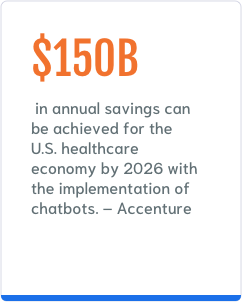
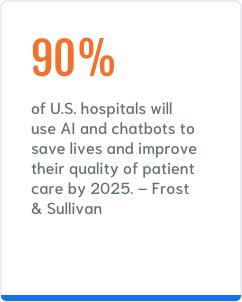
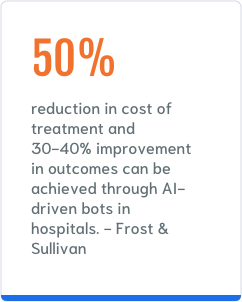
Healthcare virtual assistants can be deployed on multiple platforms (web, iOS, Android) and integrated into various channels like SMS, email, WhatsApp, and Facebook. Chatbots can adapt the user experience to the capabilities of the channel.
Take WhatsApp, for instance. It is popular across the globe and among various age groups, including the elderly. This would make a WhatsApp chatbot ideal for providing personalized interactions to ensure that elderly patients receive the care they require served through a familiar interface.
One of the first things most patients do when they experience certain symptoms is to turn to Google, which returns a motley and inconsistent set of results and diagnoses.
Healthcare chatbots can provide you with authoritative information from websites that your healthcare provider curates. Once a patient is properly authenticated, they can consider health history, route patients to the appropriate advisors & resources, send appointment reminders, and manage patient records. Healthcare chatbots can deliver lab test results, describe risks, and recommend the next steps. And they can do this with the appropriate privacy controls.
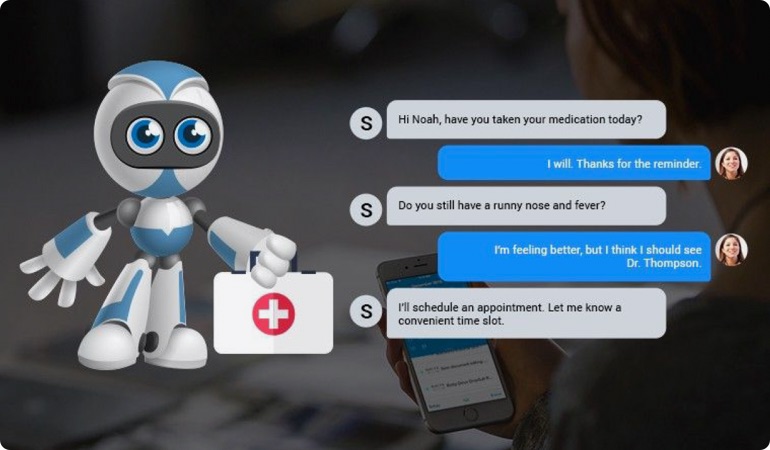
Despite all the benefits described, the healthcare industry faces a few challenges to the widespread adoption of healthcare chatbots.
Additionally, hyperautomation technologies can further enhance the capabilities of healthcare chatbots. Hyperautomation combines artificial intelligence, machine learning, and robotic process automation to automate manual processes and improve efficiency. By leveraging hyperautomation, healthcare chatbots can handle a wider range of tasks, such as automating administrative workflows, processing billing and claims, and managing patient records.
Moreover, hyperautomation for healthcare can enable seamless integration between healthcare chatbots and existing business systems and workflows. This integration ensures that chatbots can invoke follow-up actions and fulfill patients’ objectives more effectively. For example, a chatbot can schedule an appointment and automatically update the relevant medical records, reducing the burden on healthcare providers and improving the overall patient experience.
Furthermore, hyperautomation can enhance user privacy and security in healthcare chatbot interactions. With robust encryption protocols, secure authentication measures, and strict access controls, hyperautomation technologies can safeguard patient data and ensure compliance with privacy regulations. In summary, integrating hyperautomation into healthcare chatbots holds immense potential for humanizing patient care. By automating manual processes, improving workflow integration, and ensuring data privacy, hyperautomation can augment the capabilities of healthcare virtual assistants, making them more efficient, reliable, and patient-centric. This convergence of technologies can help healthcare providers deliver personalized and seamless experiences while reducing administrative burdens and improving overall patient satisfaction.
In conclusion, a healthcare chatbot can assist doctors, provide health coaching, or guide elderly patients; The opportunities & benefits are endless. Many of the challenges are surmountable with the right technology platform, leading to a personalized, patient-centric experience. In a fast-paced world where everyone is always short on time, AI-powered chatbots like A8Chat are a promising solution to connect hospitals with their patients and offer humanized care. Contact Autonom8 to schedule a demo.
Fill in your details and our executive will get in touch within 48 hours
Fill in your details and our executive will get in touch within 48 hours